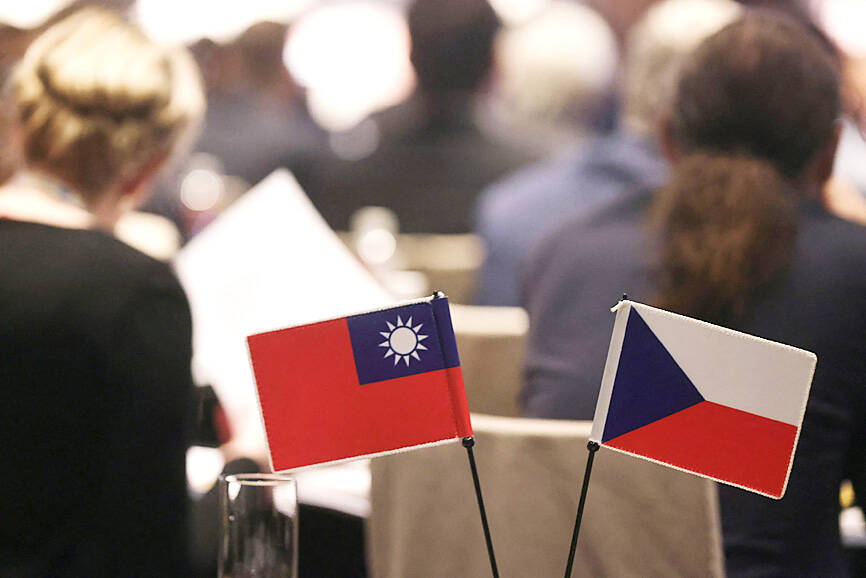Taiwan is seeking to boost bilateral trade cooperation with the Czech Republic, targeting semiconductors, information and communication technology and electric vehicles (EVs), Minister of Economic Affairs Wang Mei-hua (王美花) said yesterday.
The ministry is working on several projects with the Czech Republic, including offering semiconductor programs, scholarships and collaboration on research and development, Wang told reporters on the sidelines of the 18th session of the Taiwan-Czech Joint Business Council meeting in Taipei.
“We are pondering how to deepen collaboration with the Czech Republic in those areas, as Taiwanese enterprises are redeploying supply chain networks in response to the recent [geopolitical] situation,” Wang said.

Photo: Reuters
“The Czech Republic considers Taiwan an ideal partner in those areas,” she said.
A Taiwanese EV company plans to expand its investment in the Czech Republic, Wang said, without disclosing the company’s name.
MIH Consortium chief executive officer Jack Cheng (鄭顯聰) attended the meeting, where he discussed the state of global EV development.
MIH is an EV alliance led by Taiwanese manufacturing giant Hon Hai Precision Industry Co (鴻海精密), which has had production lines in the Czech Republic since 2000.
Wang yesterday met a 160-member Czech delegation, led by Czech Chamber of Deputies Speaker Marketa Pekarova Adamova.
To facilitate bilateral cooperation, Taiwan plans to open a new round of trade and technology meetings in September, focusing on trade, investment and a wide range of industrial cooperation on semiconductors, smart machinery, EVs, cybersecurity and “smart” city projects, the ministry said.
Collaboration in science, research and innovation would also be on the agenda, it said.
Labor shortages and a lengthy process to apply for investment incentives are two major concerns for Taiwanese companies, it said.
Taiwanese businesses, most of which are involved in electronics, have invested US$1.2 billion in the Czech Republic, the ministry said.

‘SWASTICAR’: Tesla CEO Elon Musk’s close association with Donald Trump has prompted opponents to brand him a ‘Nazi’ and resulted in a dramatic drop in sales Demonstrators descended on Tesla Inc dealerships across the US, and in Europe and Canada on Saturday to protest company chief Elon Musk, who has amassed extraordinary power as a top adviser to US President Donald Trump. Waving signs with messages such as “Musk is stealing our money” and “Reclaim our country,” the protests largely took place peacefully following fiery episodes of vandalism on Tesla vehicles, dealerships and other facilities in recent weeks that US officials have denounced as terrorism. Hundreds rallied on Saturday outside the Tesla dealership in Manhattan. Some blasted Musk, the world’s richest man, while others demanded the shuttering of his

ADVERSARIES: The new list includes 11 entities in China and one in Taiwan, which is a local branch of Chinese cloud computing firm Inspur Group The US added dozens of entities to a trade blacklist on Tuesday, the US Department of Commerce said, in part to disrupt Beijing’s artificial intelligence (AI) and advanced computing capabilities. The action affects 80 entities from countries including China, the United Arab Emirates and Iran, with the commerce department citing their “activities contrary to US national security and foreign policy.” Those added to the “entity list” are restricted from obtaining US items and technologies without government authorization. “We will not allow adversaries to exploit American technology to bolster their own militaries and threaten American lives,” US Secretary of Commerce Howard Lutnick said. The entities

Minister of Finance Chuang Tsui-yun (莊翠雲) yesterday told lawmakers that she “would not speculate,” but a “response plan” has been prepared in case Taiwan is targeted by US President Donald Trump’s reciprocal tariffs, which are to be announced on Wednesday next week. The Trump administration, including US Secretary of the Treasury Scott Bessent, has said that much of the proposed reciprocal tariffs would focus on the 15 countries that have the highest trade surpluses with the US. Bessent has referred to those countries as the “dirty 15,” but has not named them. Last year, Taiwan’s US$73.9 billion trade surplus with the US

Prices of gasoline and diesel products at domestic gas stations are to fall NT$0.2 and NT$0.1 per liter respectively this week, even though international crude oil prices rose last week, CPC Corp, Taiwan (台灣中油) and Formosa Petrochemical Corp (台塑石化) said yesterday. International crude oil prices continued rising last week, as the US Energy Information Administration reported a larger-than-expected drop in US commercial crude oil inventories, CPC said in a statement. Based on the company’s floating oil price formula, the cost of crude oil rose 2.38 percent last week from a week earlier, it said. News that US President Donald Trump plans a “secondary